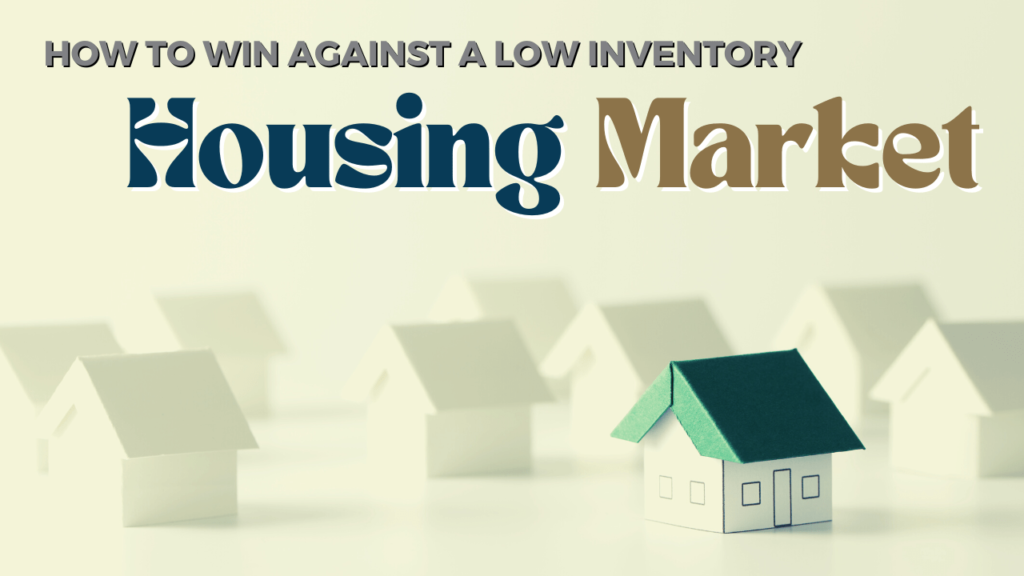
Real estate investors who are looking to buy a property in Charlotte need to know that it’s not going to be easy. Like other markets across the country, inventory is low and demand is high. This is driving prices an average of $87,000 higher than they were two years ago in Charlotte.
That doesn’t mean it’s impossible to find some opportunities in this hot and competitive market. If you’re hoping to grow your portfolio or even invest in your first property, make sure you’re working closely with local experts. A good real estate agent and an experienced property manager who understands the rental market in Charlotte will help you make your best decisions and come out ahead.
Here’s what we recommend when you want to win against the low inventory housing market we’re currently working with in Charlotte.
Prepare to be Flexible and Negotiate
In a low-inventory market, you cannot expect to get everything that you want. You’ll have to be flexible, and willing to work with sellers. You may also need to expand your investment goals a bit to include properties and deals that you might not have considered otherwise.
Prepare to move quickly as well.
If the right investment opportunity comes up, you may have less than a day to go and see it. Prepare to make an offer right away if you think it will work. In more relaxed markets, you can see a handful of properties before you decide which one you’ll make an offer on. That’s not how it works now. You’ll need to see, study, and make an offer usually on the same day. This requires you to have all of your financing in order ahead of time.
It’s possible that you’ll have to accept some compromises when it comes to price, property condition, and inclusions.
A low-inventory housing market requires you to sharpen your negotiating skills in new ways. You’ll also have to rely on your agent and property manager to help you understand what your best negotiating tools are. They should tell you where your hard stops must be as well.
Forget low balling an offer. That’s not going to work in this market. Your offer will have to be the asking price – maybe even higher if you’re competing with other investors and buyers.
There’s likely to be more give than take as you negotiate. Walk away if the deal isn’t going to make sense for you, but be prepared for a position of strength in the sellers you encounter. If you cannot get anywhere with price, prepare to negotiate for things like closing dates, included appliances, repairs, and other terms.
Consider Diversifying your Charlotte Real Estate Portfolio
It’s this type of market in which you should be thinking outside the box.
Maybe your entire portfolio consists of single-family homes, and that’s what you’re looking for now. It might take a lot longer to find the ideal single-family home to add to your portfolio. Why not consider a duplex? Or a small four-unit apartment building? Consider condos, which are cheaper and may be easier to find.
Diversifying your portfolio can provide a lot of growth potential while limiting your risk.
This is a great market in which to consider a 1031 exchange if you are interested in switching out one property for another. Not only are you saving tax dollars, you’re also putting a property on the market. You can expect to make a lot of money because the market needs that property. In turn, you can use the proceeds to buy something else. Consider selling one of those single-family homes and buying two condos, for example.
Looking at other property types can help you widen the potential pool of properties that you might buy. You’ll find opportunities that you had not considered before, and you’ll give yourself a good chance to grow your portfolio even in a market where inventory is sparse.
Pay Attention to New Construction
New housing construction continues, and while that doesn’t solve the immediate problem, it does give you an idea of where new neighborhoods are likely to gain momentum throughout Charlotte. More inventory will arrive once these developments are completed. You can expect single-family homes in gated neighborhoods, townhomes, condos, and modern apartment buildings to come online towards the end of the year and into 2023.
Buying new construction now doesn’t give you any rental income right away. You shouldn’t necessarily rush to buy up these properties unless they provide a very specific function in helping you meet your investment goals. However, you do want to pay attention. Those new construction communities may one day become your best investment option. They’ll attract high rents and stable tenants. It’s likely they’ll make an excellent option once they’re coming to market and ready for occupancy.
Look for Investment Property Leads
 Networking and relying on the information provided by local housing experts will help you navigate a low inventory market and make some progress. We’ve talked about the importance of a good real estate agent. You also need a property manager who can tell you what types of rents you can expect from a particular property and how long it will take you to get that home rent ready. Maintenance costs are rising, so you’ll also rely on their expertise to help you budget for repairs.
Networking and relying on the information provided by local housing experts will help you navigate a low inventory market and make some progress. We’ve talked about the importance of a good real estate agent. You also need a property manager who can tell you what types of rents you can expect from a particular property and how long it will take you to get that home rent ready. Maintenance costs are rising, so you’ll also rely on their expertise to help you budget for repairs.
Talk to other professionals as well. Keep your network close. If something is about to be listed that might work for you, it’s important that you know about it as soon as possible. Stay in touch with agents, Realtors, brokers, lenders, construction companies, and vendors. Get online and search the listings whenever you can. Check for auctions.
Keep your ear to the ground, as the saying goes. Position yourself to find out first when there’s a property with potential.
We know this is a tough market for investors who want to grow their real estate investment portfolios. Talk to us if you’d like some direction or advice specific to your needs. Contact our team at AM Realty.
